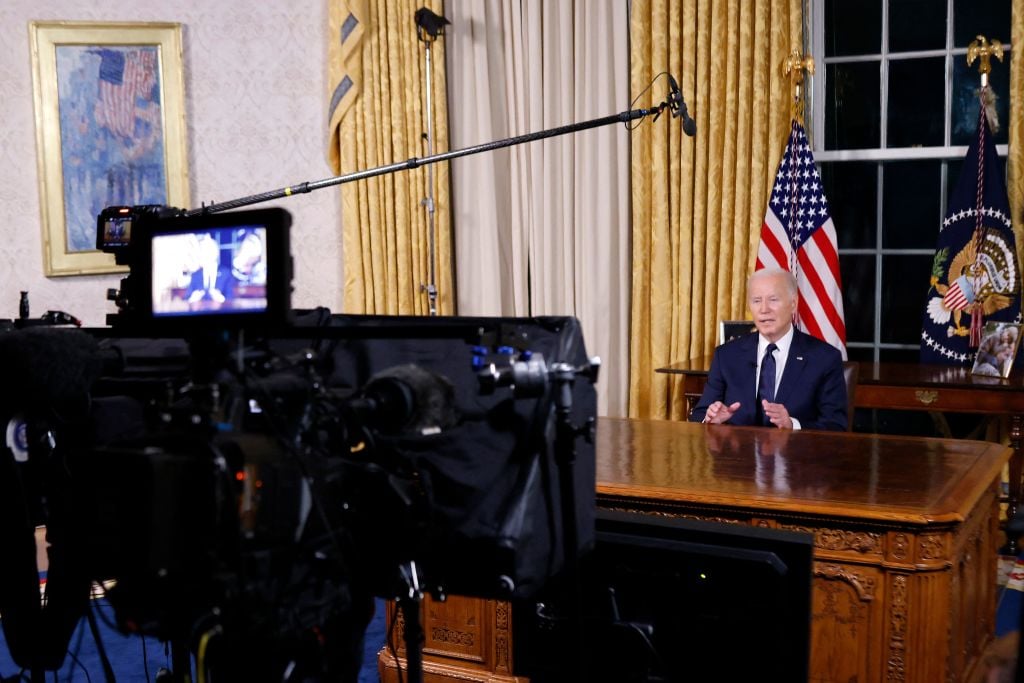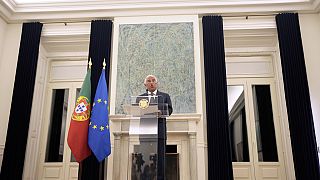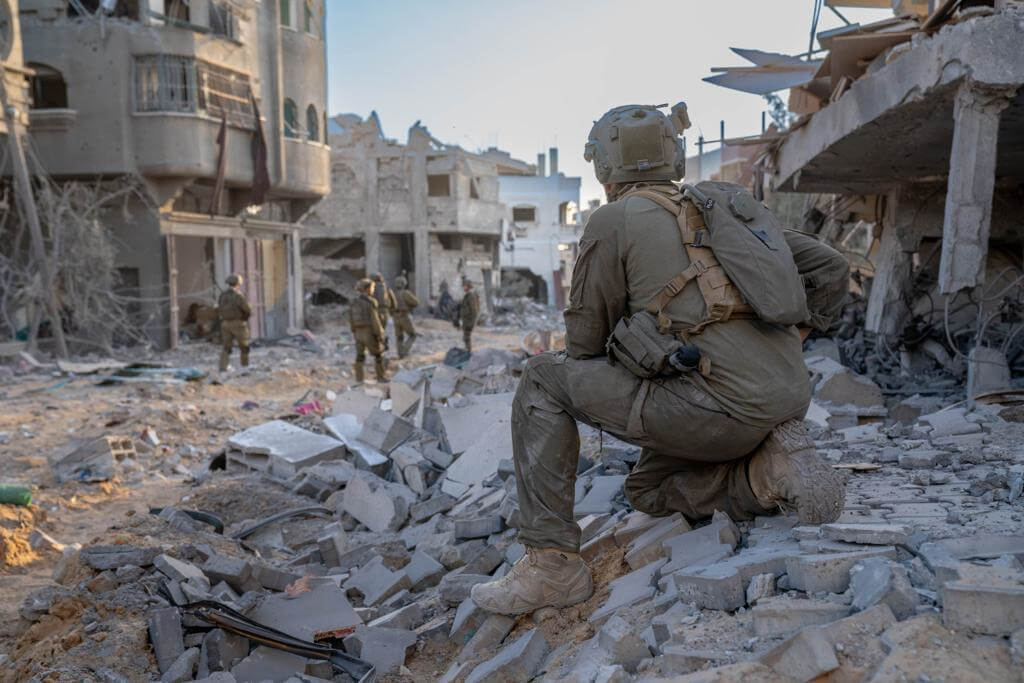US Foreign Policy Establishment Is Instrumentalizing Islamophobia, Report Shows
A new report released by Rutgers University shows how anti-Muslim bigotry pervades U.S. discourse on Palestine.

An released by researchers affiliated with Rutgers University lays out in detail the many ways in which the U.S. political establishment has instrumentalized anti-Muslim bigotry and disingenuously redefined the idea of “antisemitism” in order to defuse criticisms of the Israeli government and justify dehumanizing policies toward Palestinians.
Titled “Presumptively Antisemitic: Islamophobic Tropes in the Palestine-Israel Discourse,” the 68-page report offers a thorough examination of how the domestic foreign policy establishment and the associated Israel lobby employ Islamophobia as a tool of ideological legitimation.
Though the report’s origins predate the immediate crisis, its critique is a valuable intervention in the current political moment. While civilian deaths accrue in the course of Israel’s indiscriminate, genocidal assault on the Gaza Strip — more than have been killed as of this writing — lopsided Western media prerogatives continuously deny the populace a clear view on the crisis. In the background, the anti-Muslim bigotry that is rampant in U.S. culture helps ensure that Palestinians of all faiths, Arab people in general and Muslims across the world do not earn the public’s sympathies.
The very day that the report was released, the U.S. House of Representatives took a noteworthy step that further underscored the truth of the authors’ claims: Rep. Rashida Tlaib (D-Michigan) — the only Palestinian American in Congress — . : She had referred to Israel as an apartheid system (as major human rights organizations concur) and posted a video taken of street demonstrators as they chanted, “From the river to the sea, Palestine will be free.” The vote to rebuke her for doing so .
Influence Networks
“Presumptively Antisemitic” was commissioned by the Rutgers Law School’s Center for Security, Race and Rights. “It could not have come out at a more important time,” said report coauthor Mitchell Plitnick in an interview with Truthout about the project. Plitnick — a co-director of Jewish Voice for Peace, director of the U.S. office of B’Tselem, and president of the nonprofit ReThinking Foreign Policy — was commissioned by Rutgers to coauthor the report with .
The genesis of the report, said Plitnick, dates to two years ago, when the authors sought to confront “a long history of U.S. policy that really diminishes Palestinian rights.” As Plitnick explained it, other analyses often interrogate the question of “why we elevate Israel.” But in this report, he said, “We’re asking the other side: Why do we find it so easy to diminish the rights of Palestinians?”
One answer is that Israel is a singularly important U.S. client state, and there are big incentives, chiefly strategic and economic, to launder its actions and forestall any threat to its power or legitimacy. Capitalist society evinces a deep need to justify policies advantageous to its material interests and sanitize any violence involved in the pursuit of those interests; this is central to its process of ideologically and materially reproducing itself. Cruel and disingenuous justificatory ideology is the inevitable structural product of this need.
Key to disseminating such ideology is, of course, the media — which in the U.S. is constructed around a set of incentives and boundaries that work unconsciously to weed out dissenters and quash critical inquiry while serving up the preferred official narratives. These mechanisms are sufficient to produce both remarkable party-line conformity and the appearance of a free and critical press by allowing fervent debate and critique — within very strict bounds. In our era, those bounds are fortified by, among other things, tacit Islamophobia. To venture beyond them in a mainstream venue — like, say, by acknowledging on CNN — is to go beyond the pale. (So much so that when it happens.)
To determine some origins of this type of Islamophobic narrative propaganda — the examples not traceable to U.S. government mouthpieces, that is — the Rutgers authors looked to pro-Israel organizations with more reactionary leanings, the kind that tend to make common cause with those farther on the right. These organizations often “spend a great deal of their time undermining and caricaturing Palestinians as inherently violent, inherently dishonest,” Plitnick told Truthout. Unsurprisingly, he said the . But members of the Israel lobby also include right-wing extremists like the erratic “Zionist Organization of America,” which, for a time, .
, meanwhile, has network of Christian and right-wing Zionist organizations: dense warrens where reactionary backlash gestates and racial fears fester. There are the blandly conservative religious types like Christians United for Israel. Other groups appear deceptively innocuous, with names like “Middle East Forum” or the “Center for Security Policy.” (Others, like “Jihad Watch,” perhaps not so much.) These are joined by all manner of nationalist and militarist right-wing think tanks and advocacy organizations with interests that dovetail with those of the Israel lobby. Building on the ubiquitous anti-Muslim media coverage during the “global war on terror,” their bigotry, the report highlights, found legislative expression (concerning, if absurd). Across the nation, per the report, right-wing money “supports a wide array of projects aimed at vilifying Muslims and politically penalizing advocacy for Palestinian human rights.”
The linkages between such groups and the media are so impossibly tangled as to be indistinguishable; conservative and liberal pundits alike can reliably be heard repeating the same logics, if not the same verbatim talking points. It appears , voiced . It is a cultural substrate — what passes for “common sense” in U.S. discourse.
Self-Appointed Legitimacy
The Rutgers authors then delve into analyzing examples of Islamophobia of the U.S. variety, which revels in general dehumanization. The most common reflex is to insist that all Muslim or Arab people are terrorists (and therefore valid targets), or to otherwise about aggression or deceitfulness.
The charge of antisemitism can inflict considerable damage, and disingenuously weaponizing it remains the most reliable weapon in the Israel lobby’s rhetorical arsenal. Domestically, the claim is weaponized against . Blacklisting, firing, , or other ostracizations may well ensue. Yet, equating all criticism of Israel with antisemitism is ultimately an act of hubris. By diluting the term, as is noted by report authors, overreliance on the cynical smear only “blunts efforts against real antisemitism.”
Caught in the pincer maneuver of dehumanization and antisemitism, advocacy for Palestinian human rights has long been discredited by default in the U.S. The Palestinian struggle is “depicted in the media and by American politicians as almost entirely violent,” the report states, “even though non-violent action has been far more prominent and consistent in their struggle.”
The latter points speaks to an absurd double bind — violence is condemned, and yet “non-violent means of resistance, such as the Boycott, Divestment, and Sanctions (BDS) movement, are also discredited as antisemitic and illegitimate.” (As well as, in the case of BDS, literally criminalized, .) It seems that, violent or peaceful, there’s no pleasing occupation apologists — Palestinians should be obliged to retreat to total passivity and inaction, mutely enduring any and all crimes committed against them.
It’s instructive to contrast dominant narratives on Palestine with the establishment reaction to the 2022 Russian invasion of Ukraine, as the report authors do in their introduction. That February, it suddenly dawned on the whole Western world that violent resistance to foreign occupation was self-evidently legitimate. But those hoping that this revelation might persist and bring an end to some hypocrisies — well, that proved far too much to hope for, certainly in the case of Palestine. (And among the U.S. public and alike, it didn’t even seem to spark much meaningful reflection on the most obvious comparison, i.e. Iraq.) This is the result we can expect, given that a blanket of propaganda has smothered the facts of the occupation and , along with the many Palestinian voices who advocate for peace and are clear that they take issue with state and military policy, not the Jewish people.
“One of the key points of this report is this Islamophobic trope, this assumption, that all Muslims are antisemitic by default. They have to prove that they’re not,” Plitnick told Truthout. It has been a signature success of domestic propaganda, so effective that it produces outlier cases even among nominal leftists: the “progressive except Palestine” caveat. Nationwide, the notion has been implanted that, “at its core, standing up for Palestinian rights is motivated by antisemitism — not by wanting to protect human rights. Not by caring about the suffering of literally millions of people in the West Bank and Gaza,” Plitnick said.
The bipartisan congressional censure of Representative Tlaib is a recent and precise example () of this type of bad-faith conflation. This was also the case by both sides of the aisle — in 2021, as the report cites, she was rebuked for pointing out, again, the demonstrable . Time and again, as the report puts it, the “defense of the human rights of Palestinians” is “disingenuously turned … into an attack on Jewish people everywhere.”
Locating a Pressure Point
The coauthors, by the report’s conclusion, have identified three key realms of intervention: including Palestinian and other Muslim or Arab people in policy making and media, , and holding “Israel accountable for violating human rights.” As murderous bombing campaigns and a ground invasion roll through the Gaza Strip, many have to hold onto hope that such accountability may someday come.
In the meantime, the Rutgers findings serve to corroborate the sense that the enforcement of the Israel consensus since October 7, by its reflexive recourse to both Islamophobia and/or charges of antisemitism, is starting to mimic , old tropes and old hates recertified. After all, over 20 years, the U.S. has had a lot of practice at legitimizing the killing of innocent people in the Middle East. Perhaps that’s why, in a small but telling moment, President Joe Biden the Gaza Health Ministry’s (proven accurate) death count.
Regardless, between and running cover for Israeli atrocities, it can indeed seem that, as the report puts it, “The U.S. government’s message is clear: Palestinian lives do not matter. Worse yet, Muslims and Arabs advocating to change this reality are defamed as antisemites and censored.”
Yet it would be a grave mistake to overlook one fact: that solidarity between peoples is what subjugating powers most fear. From the report: “Discrediting any criticism of Israeli state practices violating Palestinian human rights as antisemitism overlooks the growing number of Jews and Muslims working together to promote Palestinian rights.” Further, Plitnick points out that, “We’ve seen, just in these past weeks, the tremendous effect that Jewish-Muslim unity has to oppose not only U.S. policy in Palestine, but also Islamophobia and antisemitism here at home.”
As he notes, this is an extremely powerful force. “It removes from the right this argument that defense of Israel and these policies are somehow defending Jews, when really they’re doing harm towards Jews, and quite a bit of harm towards Jews,” Plitnick told Truthout. “We’re standing up, and our Muslims allies and brothers and sisters are standing with us, and that’s a really important piece of the whole.”



